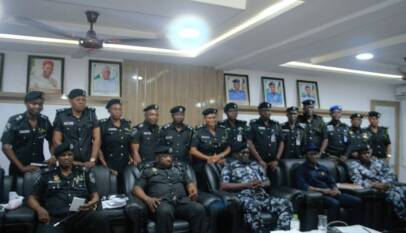A trip down memory lane of endless harassment, extortion by Policemen in Nigeria

By Okechukwu Nwanguma
The streets of Nigeria have long been marred by stories of police harassment and extortion. Despite the Nigeria Police High Command’s assurances of reforms and adherence to operational standards and rules of engagement, countless officers have continually engaged in corrupt practices, tarnishing the image of the force and the country.
This narrative reveals a series of harrowing experiences faced by ordinary Nigerians, recounting the pervasive culture of abuse, particularly focusing on extortion and harassment.
Case 1: A trip from Imo Airport to Mbaise turns sour
In Imo State sometime in 2021, a young man who flew from Lagos to Owerri to attend a burial found himself in a nightmarish scenario. Upon arrival at Sam Mbakwe Airport, he was greeted by his relatives, and they promptly set off in his relative’s vehicle to Mbaise.
However, their journey took an unexpected turn when they encountered police officers at Enyiogugu Mbaise.
Labeling the men as fraudsters without any evidence, the officers demanded they enter their vehicle. Despite their pleas for an explanation and their innocence, the officers claimed they were transporting them for questioning.
Instead, they drove to a secluded area near Dan Anyiam Stadium, Owerri where the officers unveiled their ulterior motive: extortion. They threatened the young men with dire consequences unless they paid a ransom of N500,000.
Fearful and desperate, the travelers managed to negotiate down to N60,000. One of the policemen cleverly disguised himself in mufti to avoid drawing attention, seamlessly following one of the young men to a nearby POS terminal to complete the transaction.
This incident, unfortunately, is not isolated; it reflects the ongoing impunity enjoyed by corrupt elements within the police force, who blatantly flout all reforms introduced by successive Inspector Generals.
Case 2: The Cruel Encounter of Kareem Jamiu in 2019
In another chilling account, Kareem Jamiu, a 29-year-old resident of Sagamu, Ogun State, was approached by police officers near his home. Claiming they belonged to the disbanded Special Tactical Squad, these officers accused him of being an internet fraudster based solely on a photo of his Caucasian girlfriend on his phone.
Despite his earnest explanations of his relationship, the officers showed no interest in listening. Instead, they forcibly transported him to a school near the Lagos Police Command, a journey spanning 45 kilometers. Initially demanding N100,000 for his release, the officers rummaged through his phone and discovered more money in his account. Faced with coercion, Kareem was compelled to withdraw a staggering N705,000.
It took significant advocacy from the RULAAC for the police force to recognize their officers’ misconduct. The money was returned to Jamiu, and the rogue officers were placed in custody, awaiting disciplinary measures. Such extortion cases highlight the dire need for accountability and systemic reform within the Nigerian police.
Case 3: Highway Predicament and Police Extortion
The fear of police harassment extends beyond urban areas to major highways across Nigeria. RULAAC reported a continuous stream of complaints from travelers about harassment and extortion along the Benin axis. These incidents often involved police stopping commercial vehicles and demanding bribes in exchange for allowing passengers to continue their journey.
One notable case involved a Nigerian traveler named Dennise, who returned home from the Netherlands in 2019. Stopped by self-proclaimed SARS operatives, he was extorted out of N500,000 under threats of detention. RULAAC indicated that many victims had taken to social media, documenting their harrowing encounters with law enforcement and pleading for intervention.
Victims are often forced to withdraw money from ATMs or effect transfers via POS systems to pay their captors. Tragically, these abuses occur with alarming frequency, especially targeting individuals who have recently returned from abroad, as they are seen as easily capitalizable.
Case 4: Tochukwu Ukazu’s humiliation
In a particularly alarming incident on April 24, 2024, Tochukwu Ukazu, a U.S. returnee, was subjected to violent harassment by three police officers while traveling with his family. Stopped along Mbaise Road, Ukazu recorded the events on his phone when officers threatened him and forced their way into the vehicle.
Upon discovering that he was filming, the officers became aggressive, physically assaulting him and confiscating his phone. They coerced him into withdrawing N100,000 from a POS while forcing his family to witness the entire ordeal. However, Ukazu’s phone contained software that retained deleted files, allowing him to recover the incriminating video evidence.
Thankfully, RULAAC stepped in, bringing attention to the incident and compelling the Imo State Commissioner of Police to take swift action. Officers responsible for the extortion were apprehended, and they were made to face disciplinary procedures in this instance, showcasing the power of advocacy in combating police misconduct.
Case 5: Dismissals and accountability
On August 12, 2022, the Nigeria Police announced the dismissal of Opeyemi Kadiri, a policeman caught searching a commuter’s phone on the roadside, an act contrary to the directives from the Inspector General of Police. This dismissal was part of a broader effort to curb corruption and misconduct, with RULAAC commending the Nigeria Police Force for taking punitive action against its officers.
In 5 months before Kadiri’s dismissal, more than twelve police officers had faced dismissal due to their involvement in various misconduct, prompting hope for reform among citizens. However, the systemic nature of corruption within the police force, perpetuated by a flawed culture of recruitment and promotion driven by connections rather than merit, remains a critical issue.
Case 6: The Force PRO’s Press Release on the Recent Extortion Incident at Benin Bypass
The recent viral video showing officers extorting money along the Benin Bypass prompted a strong response from ACP Olumuyiwa Adejobi, who reiterated the Nigeria Police Force’s commitment to professionalism and integrity. The Chief Superintendent of Police and five officers involved were summoned for disciplinary action, highlighting the importance of public vigilance and the role of social media in holding law enforcement accountable.
Need for far-reaching reform
However, RULAAC cautions against viewing these isolated cases as sufficient efforts for reform. RULAAC believes that systemic corruption requires comprehensive reform, targeting not just individual misconduct but the institutional culture that fosters unethical behavior.
The foregoing stories of harrowing encounters with police extortion in Nigeria illustrate a pervasive culture of abuse that has persisted despite reform efforts. While incidents of accountability through punishment of individual officers signal a move in the right direction, true reform necessitates addressing the systemic issues underlying police misconduct. This includes increasing police budgets, improving welfare and working conditions, and instilling a culture of integrity and accountability within the police force.
Advocacy organizations like RULAAC will continue to play a pivotal role in drawing attention to these abuses, but citizens must remain vigilant and active in demanding justice. As Nigeria grapples with these challenges, the government must commit to comprehensive reforms that uphold the rights and dignity of all citizens, ensuring law enforcement is seen as a protector rather than a predator or adversary. Only through sustained efforts can public trust in the police be restored and the cycle of harassment and extortion be broken.
Nwanguma, Executive Director, Rule of Law and Accountability Advocacy Centre (RULAAC), a non-profit, non-governmental human rights advocacy organization in Nigeria.
Stakeholders hail FG, Oyetola, Dantsoho as E’TO revolution eases Apapa gridlock
Stakeholders in the maritime and transport sectors have commended the Federal Government, …






